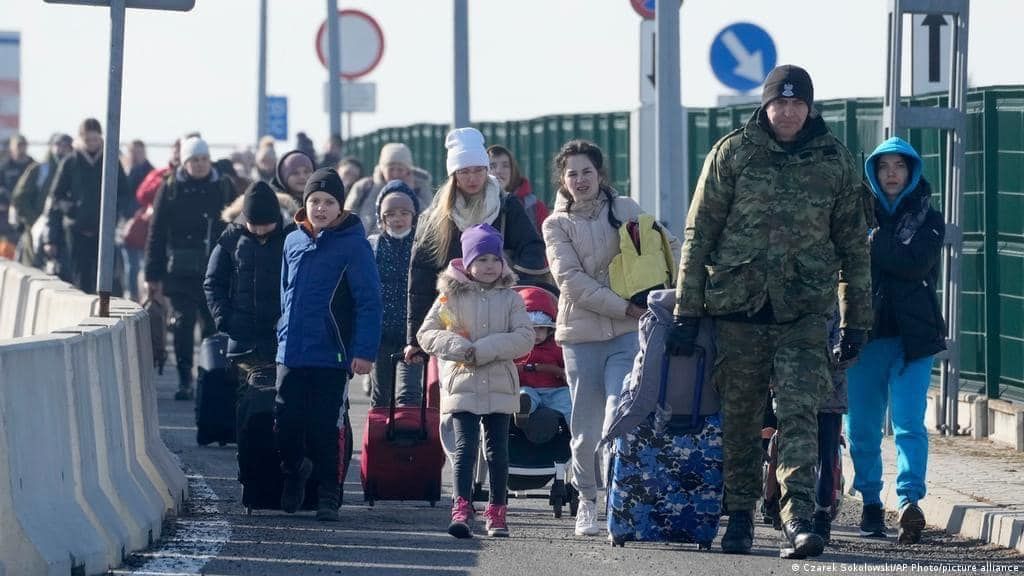How to host a refugee, spot fake war images, say “welcome” in Ukrainian, and more
By Susan D’Agostino | May 6, 2022
 Ukrainian refugees from 2022, crossing into Poland. Credit: Міністерство внутрішніх справ України. Accessed via Wikimedia Commons. CC BY 4.0.
Ukrainian refugees from 2022, crossing into Poland. Credit: Міністерство внутрішніх справ України. Accessed via Wikimedia Commons. CC BY 4.0.
Even though Russia spent last December and January massing troops along its border with Ukraine, its brutal February 24th invasion managed to shock the world. Soon after, Putin waved his nuclear saber. The Russian military bombed a maternity hospital and committed other heinous war crimes. Russian soldiers also held Chernobyl nuclear power plant workers hostage. Six million Ukrainians have fled their country. What initially appeared to be a David-and-Goliath-like battle of the massive Russian military against a small nation intent on survival did not end quickly.
“There are decades where nothing happens, and there are weeks where decades happen,” Vladimir Lenin once said.
As the biggest European land war since World War II enters its 11th week, many people around the world are adjusting to the notion that the war is unlikely to end soon. Many also have questions about how to support Ukraine right now and how they can make sure the war information they receive is accurate. Here are answers to and thoughts about some of those questions:
- How can I host a Ukrainian refugee?
- How can I connect with a Ukrainian refugee?
- Can I adopt a Ukrainian child in need of a home?
- Where can I find reliable assessments of the military situation in Ukraine?
- How can I tell whether war images and videos on social media are real?
- Is travel to Europe right now a bad idea?
- How or where can I donate money or items to help Ukrainians?
- Can I help with the looming food crisis?
- How can I talk to children about war?
- How do I stay informed about the war without getting overwhelmed?
How can I host a Ukrainian refugee?
Nearly 6 million Ukrainians have fled their country since Russia invaded in late February, according to the United Nations. Most have sought safety, protection, and assistance in neighboring countries, including Poland, Romania, Russia, Hungary, Moldova, Slovakia, and Belarus. Some have traveled much farther, while others have been displaced inside Ukraine.
Those hoping to host one or more refugees may register their interest with their government or an international NGO. For example, the United Kingdom’s refugee program is called Home for Ukraine. The Irish Red Cross has also issued a call for its citizens to pledge a spare room or vacant property. US President Biden recently announced that the United States would welcome up to 100,000 Ukrainian refugees. Interested Americans can find out more on the Uniting for Ukraine website.
Individuals and private organizations have also worked to make hosting refugees easier. Two Harvard University students, for example, launched a website known as Ukraine Take Shelter that connects Ukrainian refugees with potential hosts and housing all around the world. Both refugees and hosts are required to verify their identities by way of a government-issued ID card or passport. The site also advises refugees on how to avoid potentially dangerous situations. Also, Airbnb—a website typically frequented by vacationers—has a webpage in which individuals can offer refugees stays for free or at a discount.
How can I connect with a Ukrainian refugee?
Language is a “way to build empathy and connection with people around the world, and you can do this whether you know one word or 100,” Duolingo, a free language-learning platform, writes on its “Essential phrases for helping Ukrainian refugees” blog. Here are a few English phrases from the Duolingo Ukrainian phrase book to get you started:
| English phrase | Ukrainian | Ukrainian pronunciation |
| Hello!
|
Добрий день! | Dobri den! |
| Welcome!
|
Ласкаво просимо! | Laskavo prosimo |
| Please
|
Будь ласка | Bood laska |
| Thank you
|
Дякую | Dyakuyu |
| My name is…
|
Мене звати… | Mene zvati… |
| Is everything okay? | Усе добре?
|
Oose dobre?
|
| Is your family with you?
|
Ваша сім’я з вами? | Vasha seemya z vami? |
| This will be your room. | Це буде ваша кімната.
|
Tse bude vasha keemnata.
|
| Can I help with something?
|
Чи можу я допомогти з чимось?
|
Chi mozhu ya dopomohti z chimos?
|
| I need to make a phone call. | Мені потрібно подзвонити. | Menee potreebno podzvoniti. |
| Please write me if you need something. | Будь ласка, напишіть мені, якщо вам щось потрібно. | Bood laska, napisheet menee, yaksho vam shos potreebno. |
The phrase book also provides translations in Polish, Russian, German, and French. If you are looking for more, Duolingo also offers an online course titled, “Learn Ukrainian in just 5 minutes a day. For Free.”
Can I adopt a Ukrainian child in need of a home?
Those interested in adopting a Ukrainian child during the war are urged to exercise caution, according to the US State Department. “It can be extremely difficult during crises to determine whether children who appear to be orphans are truly eligible for adoption and immigration,” a statement on the website says. Children in war-torn countries may be separated from their families only temporarily. Even those whose parents are deceased may have relatives who are looking for them. Some children living in orphanages may have parents but are staying there for safety. An experienced, immigration lawyer can help.
Where can I find reliable assessments of the military situation in Ukraine?
The Institute for the Study of War offers daily updates on Ukraine’s defense and Russia’s advance. Each installment includes a general summary, key takeaways, and maps. The information is narrowly focused on “assessing and forecasting military operations” rather than Russian war crimes, though they note that they “utterly condemn these Russian violations of the laws of armed conflict, Geneva Conventions, and humanity.”
The BBC’s visual journalism team relies on information and maps from the Institute for the Study of War for their Ukraine war in maps: Tracking the Russian invasion.
How can I tell whether war images and videos on social media are real?
Information about the war on the internet and social media ranges from true and informative to false and harmful. Before sharing, pause in an effort to determine whether the information is legitimate.
Before retweeting, for example, you might fact check the information with a reputable news source. The BBC, for example, has a “reality check” page that allows you to verify claims or images you see on social media. You might also look to see if the tweeter is verified by the platform or if their bio identifies an affiliation with a reputable organization.
Zoom in on images, Wired magazine suggests. Doing so may enable you to spot a fake. “A poorly altered image or video may trip your inner alarms, which are sensitive to things like impossible lighting and angles even if your conscious mind isn’t.” In short, if an image looks wrong, it probably is.
Google’s reverse image search can also help you fact check images. While the program does not give a thumbs up or down on the merit of the image, it does provide “a digital paper trail of where an image has appeared on the internet”—and that may be enough to determine that it is suspect.
When you are uncertain about the veracity of the information, do not share it.
Is travel to Europe right now a bad idea?
After more than two years of restricted travel due to COVID-19, many hoped 2022 would be a year for travel, including to Eastern Europe. But some would-be travelers, including nearly half of Americans, reported in March that they were reconsidering travel to Europe given the war in Ukraine, according to MMGY Global, a marketing company that specializes in travel.
For information on whether your destination of choice is safe, monitor news from the region and also look to government-issued travel advisories. The US State Department, for example, offers country-by-country travel advisories rated on a scale of one to four, where level one means “exercise normal precautions” and level 4 means “do not travel.” As of today, for example, Croatia, Romania, Hungary, Slovakia, Latvia, Lithuania, Georgia, and Bulgaria are all considered level one. Poland is considered level three, though not due to its proximity to the war but to COVID-19 restrictions. Ukraine, Moldova, and Russia were designated as level four due to the war.
The United Kingdom Foreign Office also has a webpage offering country-by-country travel advice.
How or where can I donate money or items to help Ukrainians?
Consider donating cash rather than goods. Staffing shortages due to the COVID-19 pandemic may slow the shipment and processing of items such as clothing, medical supplies, or food between countries. Problems in the global supply chain due to the war may also delay shipments.
“Time is of the essence in Ukraine,” Dan Walden, Unicef’s senior emergencies specialist, told The Guardian. “ We can get money transferred from our bank to a local bank in Ukraine within moments.”
The Ukrainian Red Cross, the United Nations Human Commissioner for Refugees, and the World Food Programme are all reputable organizations that need money to assist in their efforts remaining nimble while helping Ukrainians. If you have another philanthropic organization in mind, consider looking it up on Charity Navigator—a tool that rates more than 1.5 million US-based nonprofit organizations on their accountability and transparency. This website also offers recommendations for assessing organizations that not listed on their site. For example, you might scrutinize the percentage of expenses the charity spends on administrative overhead and executive pay. They recommend that at least 75 percent of your donation should be spent on programs. Bypass any organization that is not transparent about its financial information.
You might also seek out evidence that a charity is effective in accomplishing its stated mission. Individual testimonials can be compelling but do not necessarily provide evidence of broad impact. Finally, you might search online to see if any reputable news organizations reported concerning practices of the organization.
Can I help with the looming food crisis?
Developing countries’ “breadbasket is being bombed,” Secretary-General António Guterres told his Security Council in March. That’s because Russia and Ukraine produce approximately 20 percent of the world’s corn exports, 30 percent of the world’s wheat exports, and 60 percent of the world’s sunflower oil. Also, the war has disrupted food supply chains, leading to worldwide shortages.
Now, Egypt—the world’s largest importer of Ukrainian wheat—is currently scrambling to make up for the shortfall. Nigeria, Cameroon, Tanzania, Uganda, Sudan, and other African countries are also at risk of food insecurity, according to a Human Rights Watch report. Many Middle Eastern countries, including Syria, Yemen, and Lebanon, are also vulnerable, according to the Council on Foreign Relations. Grocery stores in Demark are rationing sunflower oil as a result of the war. Same goes for grocers in the United Kingdom, Spain, Greece, Turkey, and Belgium, according to the New York Times.
But panic buying—an inclination to purchase items in bulk upon hearing news of shortages—will only exacerbate the existing trouble. That’s because famines are not caused by food shortages. Rather, famines happen when vulnerable people lack access to existing food, according to economist Amartya Sen, recipient of the 1998 Nobel Prize recipient.
You can help those at risk of hunger by donating money to the World Food Programme—the 2020 Nobel Peace Prize recipient—or another reputable relief organization. For an understanding of why cash donations are better than food, see the previous question: “What’s the best way to donate items or money to help Ukrainians?”
For more information on the looming global hunger crisis, see this Bulletin article.
How can I talk to children about war?
Children may not have their facts straight about the war. And even if they do, those facts may leave them feeling anxious, worried, or confused. Parents and caregivers may want to shield children from this global trauma, but the science says that children experience better mental health outcomes when their parents and caregivers talk with them.
For advice on how to start a conversation about the war with children, how to model self-care, compassion, and resiliency during unsettling times, and how to look for and be “among the helpers,” see this Bulletin article.
How do I stay informed about the war without getting overwhelmed?
This last question, admittedly, offers an opportunity to shamelessly plug independent new organizations like the Bulletin of the Atomic Scientists. (To read our past coverage on the war in Ukraine, including commentaries from global security experts, click here.) The BBC, New York Times, Associated Press, Reuters, and The Guardian are also fact-based sources. For on-the-ground reporting, you might subscribe to the Kyiv Independent. (In a recent Bulletin story, we interviewed Kyiv Independent defense reporter Illia Ponomarenko.)
Finally, check your social media use. Social media’s algorithms contribute to polarization, and sorting through fast-spreading misinformation can be challenging, as detailed in this recent MIT report. Doomscrolling is not good for anyone.
Together, we make the world safer.
The Bulletin elevates expert voices above the noise. But as an independent nonprofit organization, our operations depend on the support of readers like you. Help us continue to deliver quality journalism that holds leaders accountable. Your support of our work at any level is important. In return, we promise our coverage will be understandable, influential, vigilant, solution-oriented, and fair-minded. Together we can make a difference.
Keywords: Russia, Ukraine, food insecurity, nuclear risk, nuclear weapons, refugees, war, war images
Topics: Nuclear Risk, Nuclear Weapons














